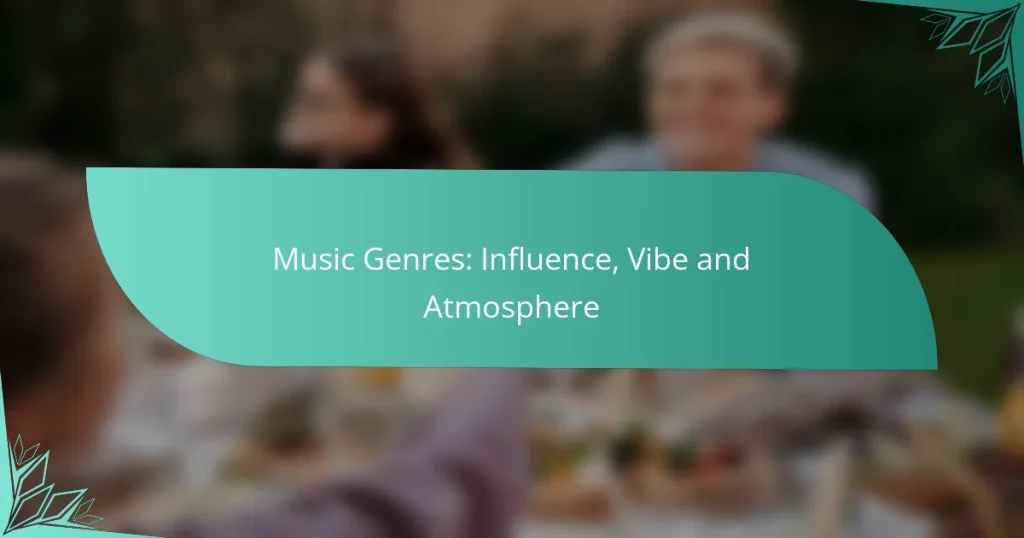Music genres are pivotal in shaping the atmosphere of events and venues, as they dictate themes, audience engagement, and artist collaborations. Each genre carries its own unique vibe, influencing emotions and social interactions, which can significantly enhance the overall experience for attendees. Understanding these nuances allows for more thoughtful selections of music that resonate with specific demographics and occasions.
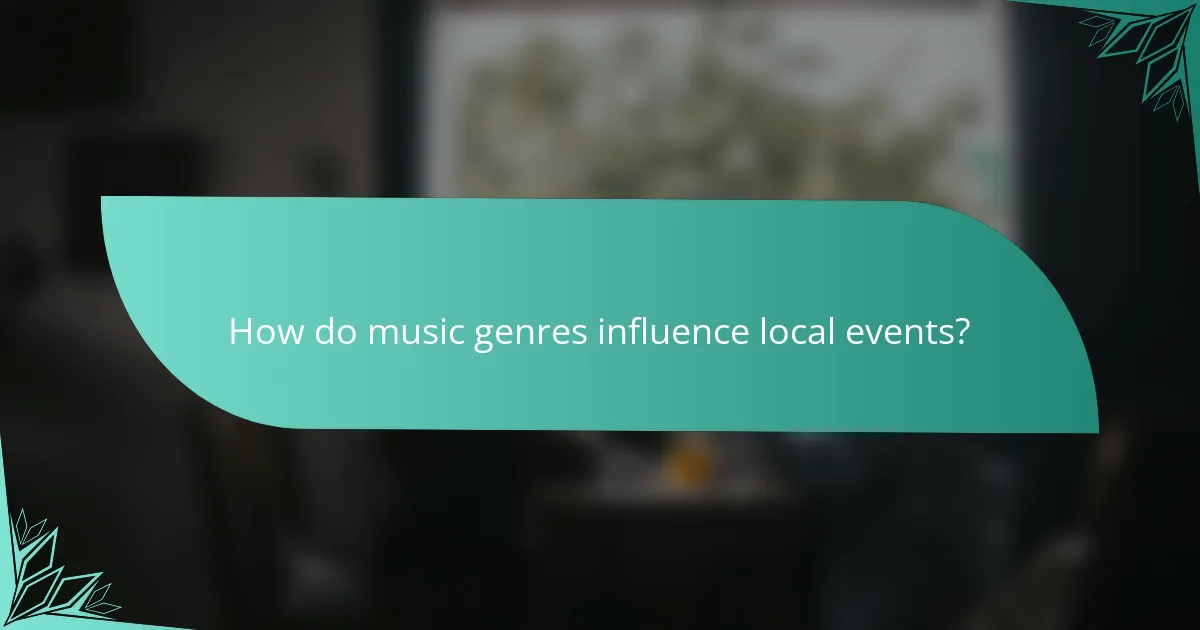
How do music genres influence local events?
Music genres significantly shape local events by determining their themes, audience engagement tactics, and artist collaborations. Different genres evoke unique vibes and atmospheres that can attract specific demographics and create memorable experiences.
Genre-specific event themes
Each music genre carries its own cultural significance and aesthetic, influencing the overall theme of events. For instance, a jazz festival may feature elegant decor and a sophisticated ambiance, while a hip-hop event might focus on urban art and street culture. Understanding these themes helps organizers tailor their approach to resonate with attendees.
When planning events, consider aligning the theme with the genre’s essence. This can include the choice of venue, promotional materials, and even food and drink options. For example, a country music event could incorporate Southern cuisine to enhance the experience.
Audience engagement strategies
Engaging the audience effectively is crucial for the success of genre-specific events. Strategies can include interactive activities like dance-offs for electronic music or sing-alongs for rock concerts. These activities foster a sense of community and enhance the overall enjoyment of the event.
Utilizing social media platforms to promote events can also be genre-specific. For instance, electronic music events often thrive on platforms like Instagram and TikTok, where visual content can attract younger audiences. Tailoring engagement strategies to the genre’s typical audience can significantly boost attendance and participation.
Local artist collaborations
Collaborating with local artists can enhance the authenticity of music events and draw in local crowds. By featuring homegrown talent, organizers can create a sense of pride and connection within the community. This is particularly effective in genres like folk or indie, where local narratives resonate strongly with audiences.
Consider hosting open mic nights or showcases that allow local musicians to perform alongside more established acts. This not only supports local talent but also enriches the event’s atmosphere, making it more appealing to attendees who appreciate community involvement in the arts.
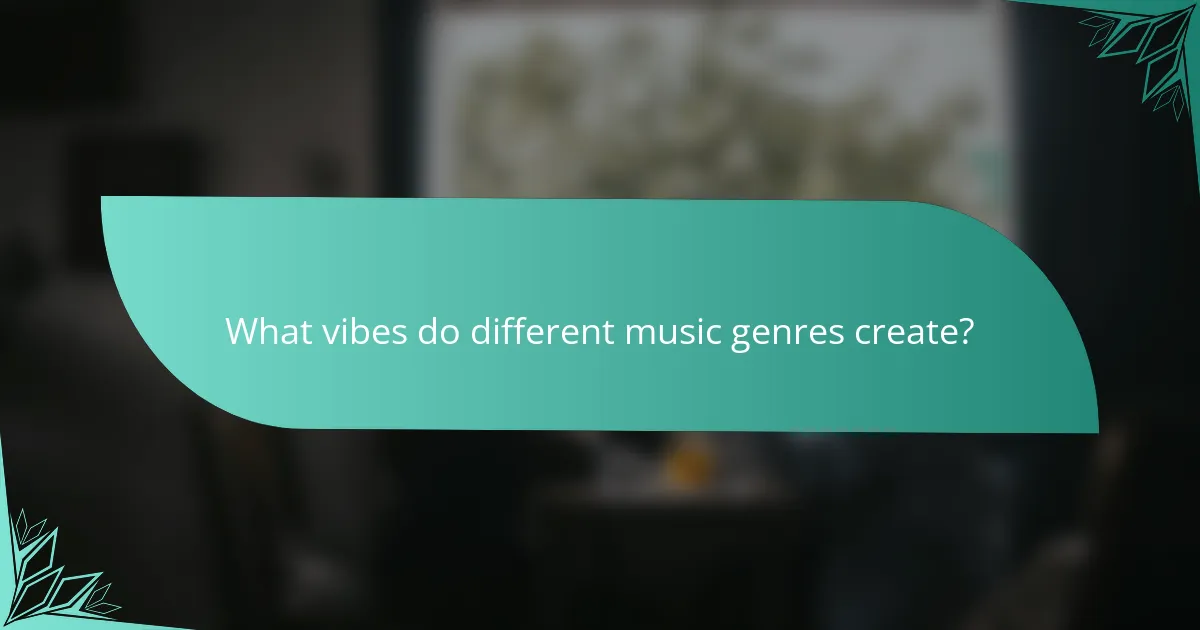
What vibes do different music genres create?
Different music genres evoke distinct vibes that can influence emotions and social settings. Understanding these vibes helps in selecting the right genre for various occasions, enhancing the overall experience.
Emotional responses by genre
Each music genre tends to elicit specific emotional responses. For instance, classical music often promotes feelings of calm and introspection, while rock music can energize and inspire a sense of rebellion. Genres like jazz may evoke nostalgia and sophistication, whereas pop music typically generates feelings of happiness and excitement.
When curating a playlist, consider the emotional tone you want to achieve. For relaxation, opt for genres like ambient or acoustic. If you aim to motivate or energize, genres like electronic dance music (EDM) or hip-hop can be effective choices.
Atmospheric settings for genres
The atmosphere created by different music genres can significantly enhance various settings. For example, ambient music is ideal for quiet environments like cafes or yoga studios, fostering a serene atmosphere. In contrast, upbeat pop or dance music suits lively settings such as parties and clubs, encouraging social interaction.
When selecting music for an event, think about the desired ambiance. For formal gatherings, genres like classical or smooth jazz can create an elegant vibe. For casual get-togethers, consider mixing genres like indie and folk to maintain a relaxed yet engaging atmosphere.
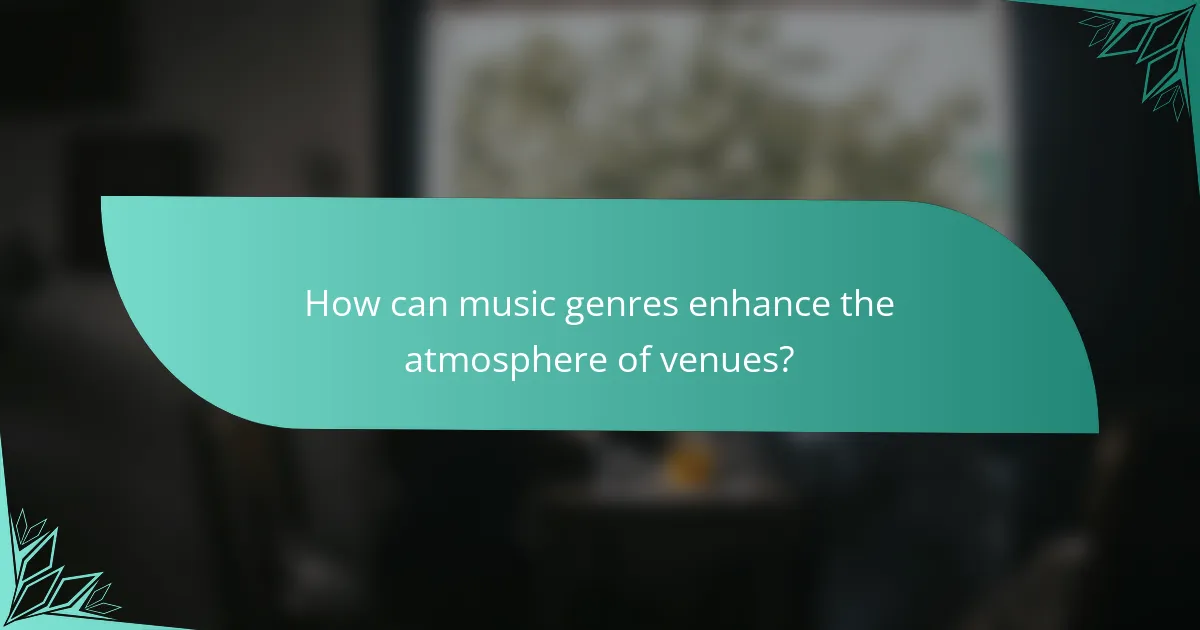
How can music genres enhance the atmosphere of venues?
Music genres play a crucial role in shaping the atmosphere of venues by influencing the mood and energy of the space. Different genres can evoke specific emotions and create distinct vibes, making the choice of music essential for enhancing the overall experience for patrons.
Soundtrack selection for ambiance
Selecting the right soundtrack is vital for establishing the desired ambiance in a venue. For example, soft jazz or acoustic music can create a relaxed atmosphere in a café, while upbeat pop or electronic tracks may energize a nightclub. Consider the time of day and the target audience when curating playlists.
Utilizing genre-specific playlists can help maintain consistency in the venue’s vibe. Venues might also consider the volume level; softer music encourages conversation, while louder music can create excitement. Regularly updating the playlist can keep the atmosphere fresh and engaging.
Live performances and venue atmosphere
Live performances can significantly enhance a venue’s atmosphere by providing an immersive experience. Genres such as rock or hip-hop can create a vibrant and dynamic environment, attracting larger crowds and fostering a sense of community among attendees. The energy of live music often surpasses that of recorded tracks.
When hosting live events, consider the acoustics and layout of the venue to optimize sound quality and audience engagement. It’s also important to promote the performances effectively to draw in the right crowd. Collaborating with local artists can create a unique atmosphere and support the community.
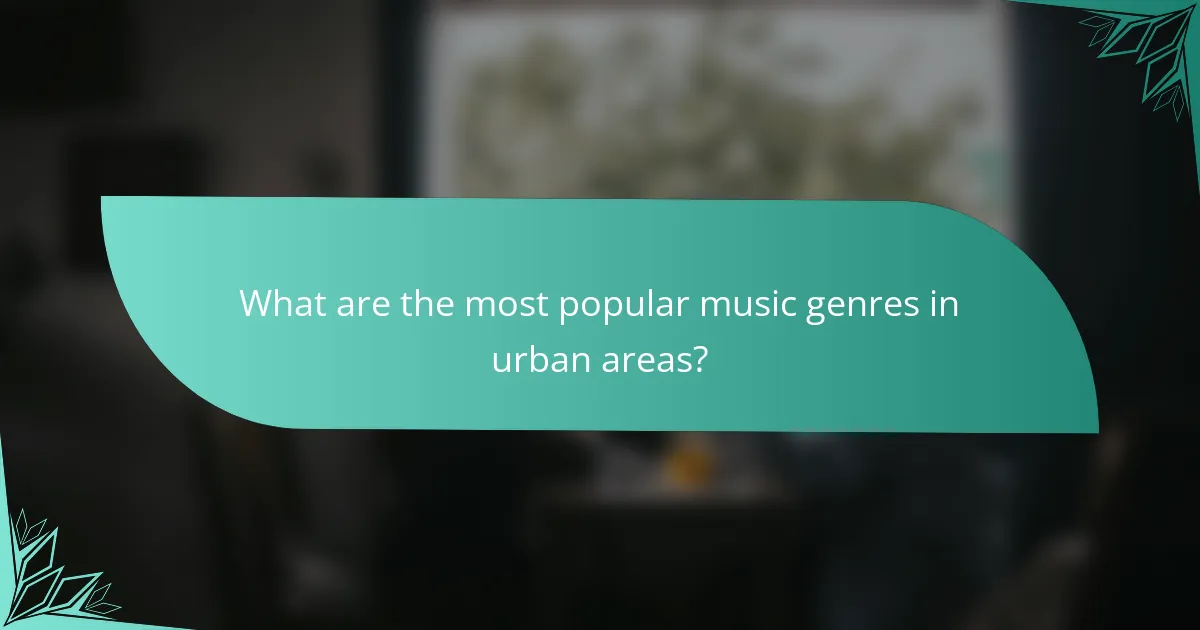
What are the most popular music genres in urban areas?
In urban areas, popular music genres often reflect the diverse cultural influences and lifestyles of the population. Genres like hip-hop, R&B, and electronic dance music dominate the scene, resonating with the vibrant energy and social dynamics of city life.
Top genres in Los Angeles
Los Angeles is a melting pot of musical styles, with hip-hop and pop at the forefront. The city is home to major artists and record labels, making it a hub for trends in these genres. Additionally, electronic music, particularly house and techno, thrives in LA’s nightlife, attracting both local and international talent.
Other notable genres include rock and indie music, which have a strong presence in various venues across the city. The diversity of cultural backgrounds in Los Angeles also fosters a rich blend of Latin music, such as reggaeton and salsa, contributing to the city’s unique soundscape.
Emerging genres in New York City
New York City is known for its dynamic music scene, where genres like trap and alternative R&B are gaining traction. These styles often incorporate elements from various influences, reflecting the city’s eclectic nature. The vibrant underground scene also supports experimental genres, pushing the boundaries of traditional music.
Additionally, genres like Afrobeats and K-pop are becoming increasingly popular in NYC, showcasing the city’s global connectivity. Venues across the city host a variety of events, allowing emerging artists to gain exposure and connect with diverse audiences.
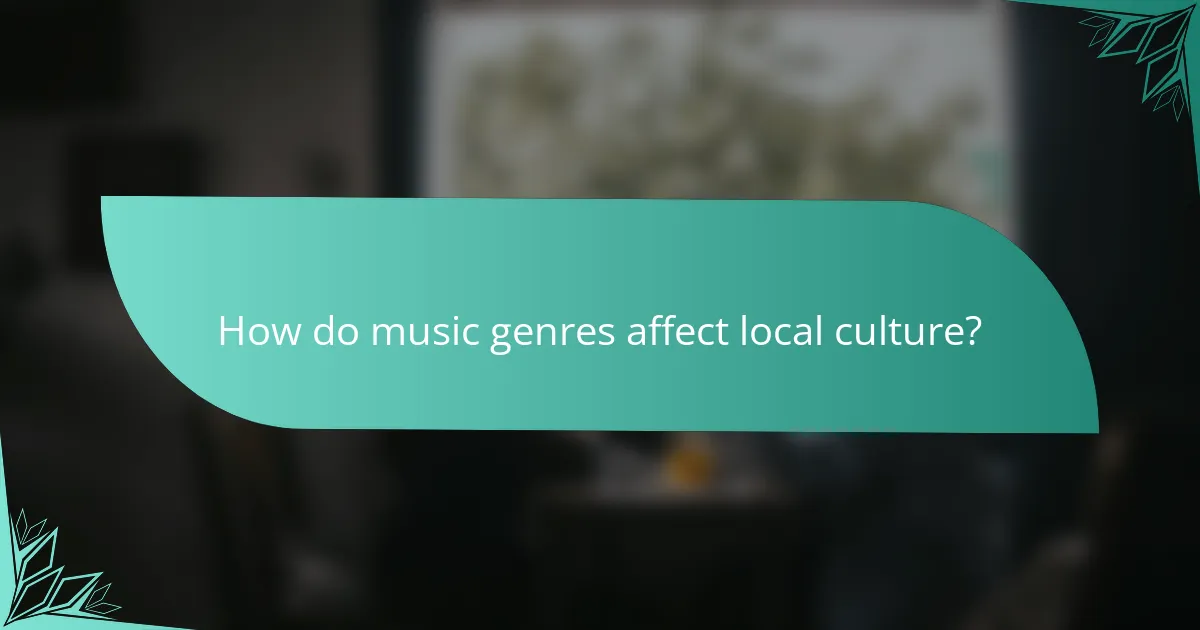
How do music genres affect local culture?
Music genres significantly shape local culture by influencing social interactions, artistic expressions, and community values. Different styles of music can foster unique atmospheres and traditions that reflect the identity and history of a place.
Influence on local art scenes
Music genres often serve as a catalyst for local art scenes, inspiring visual artists, performers, and writers. For instance, the rise of hip-hop has led to vibrant street art and poetry slams in urban areas, while folk music can inspire traditional crafts and storytelling in rural communities.
Local galleries and performance spaces frequently showcase works that resonate with specific music styles, creating a symbiotic relationship between sound and visual art. This interaction not only enhances cultural richness but also attracts tourism and community engagement.
Community identity through music
Music genres play a crucial role in shaping community identity by providing a shared experience and common ground for residents. Genres like reggae in Jamaica or country music in the southern United States foster a sense of belonging and pride among locals, often becoming integral to cultural celebrations and festivals.
Communities may also rally around music events, such as local concerts or music festivals, which strengthen social ties and promote cultural heritage. By embracing specific genres, communities can maintain their unique identities while also inviting diverse influences that enrich their cultural landscape.
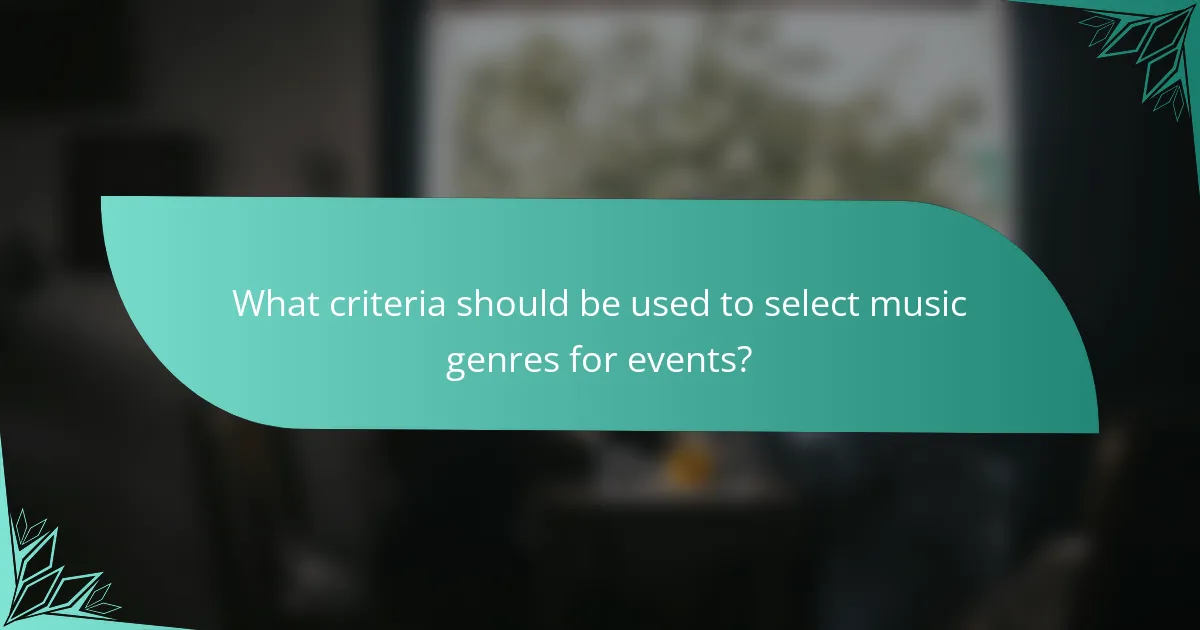
What criteria should be used to select music genres for events?
Selecting music genres for events involves understanding the audience, aligning with the event’s theme, and creating the desired atmosphere. Effective genre selection enhances guest experience and engagement, making the event memorable.
Target audience demographics
Understanding the target audience demographics is crucial when choosing music genres. Consider factors such as age, cultural background, and musical preferences, as these elements significantly influence what genres will resonate with attendees.
For instance, younger audiences may prefer pop, hip-hop, or electronic music, while older demographics might lean towards classic rock, jazz, or country. Conducting surveys or analyzing past event data can provide insights into the preferred genres of your audience.
Event type and theme alignment
The type of event and its theme play a vital role in genre selection. A corporate event may require more subdued, instrumental music, while a wedding might benefit from romantic ballads or upbeat dance tracks. Aligning the music with the event’s purpose helps set the right mood.
For themed events, such as a 1980s party, incorporating genres like new wave or synth-pop can enhance the overall experience. Always ensure that the music complements the event’s atmosphere, encouraging guests to engage and enjoy.
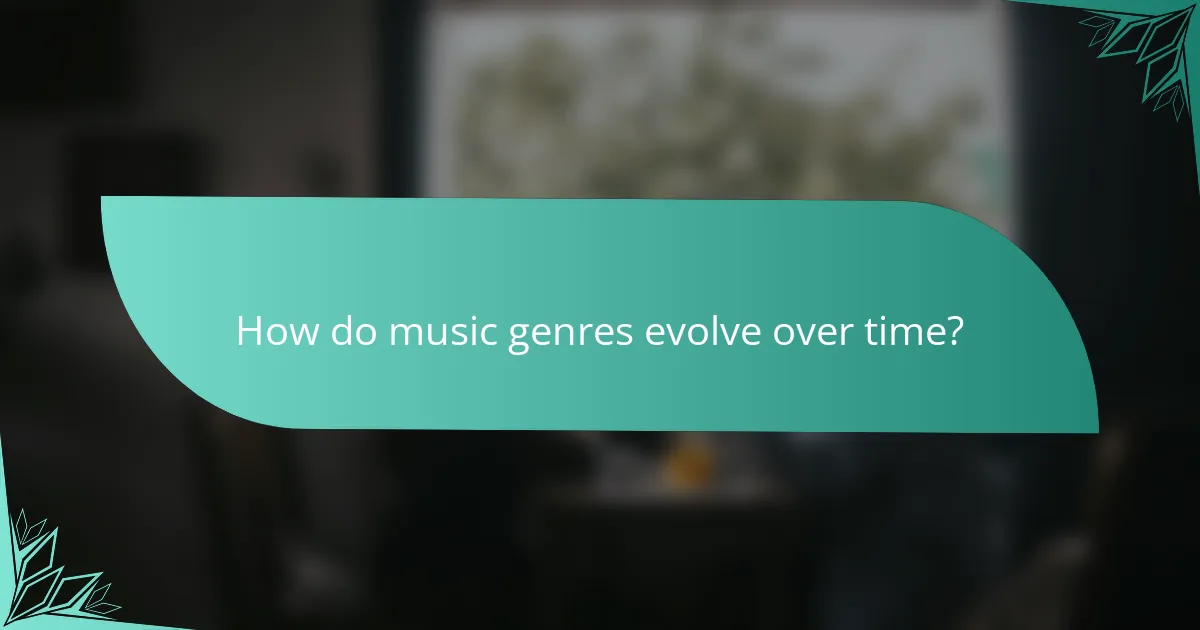
How do music genres evolve over time?
Music genres evolve through a combination of cultural influences, technological advancements, and social changes. Over time, genres blend and transform, leading to new styles that reflect the current societal context and artistic experimentation.
Historical influences on genre development
Historical events, such as wars, migrations, and technological innovations, have significantly shaped music genres. For instance, the Great Migration in the United States led to the rise of blues and jazz as African American communities moved north, bringing their musical traditions with them.
Additionally, the advent of recording technology in the early 20th century allowed for the wider dissemination of various genres, influencing their development. Genres like rock and roll emerged from the fusion of rhythm and blues with country music, showcasing how historical contexts can create new sounds.
Current trends in genre fusion
Today, genre fusion is a prominent trend, with artists blending elements from multiple styles to create innovative music. Genres like hip-hop, pop, and electronic music frequently incorporate influences from rock, jazz, and world music, resulting in diverse soundscapes that appeal to a broad audience.
Streaming platforms have facilitated this trend by allowing listeners to discover and share a wide variety of music. As a result, artists are increasingly experimenting with cross-genre collaborations, leading to the emergence of hybrid genres that reflect contemporary tastes and cultural exchanges.
